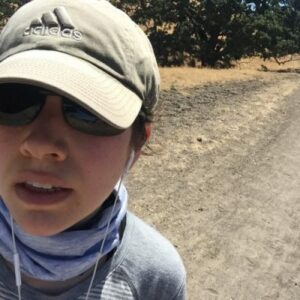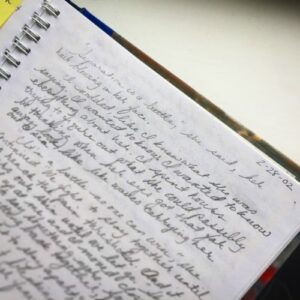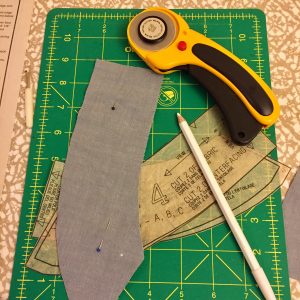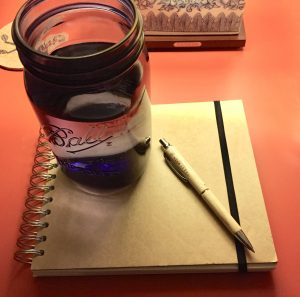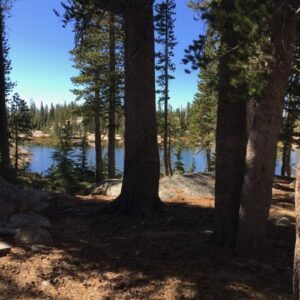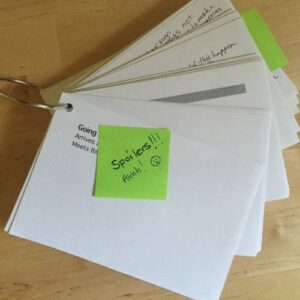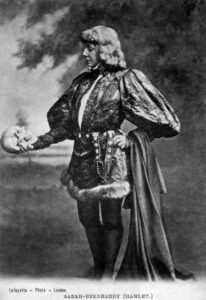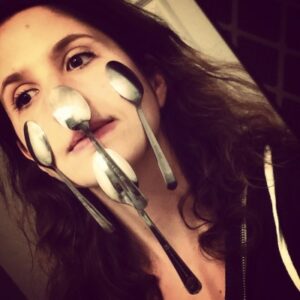Posts by Allie Larkin
Flickr Creative Commons: Boxer Bob
I needed last Friday to be a great writing day. I knew exactly where to start. I was going to get up early, make my meals for the day, and write Pomodoro style all the way through to evening. I’d ignore social media. Wouldn’t even read the news.
Just a quick peek at the headlines to make sure the world wasn’t ending and then…holy hell, how was it two PM? Because, of course, history making news days are never really convenient to one’s writing schedule.
By two-thirty, frayed and bleary-eyed, I felt like I’d read the entire internet. Surely my writing day was toast. But I also recognized that I needed a break from news updates. There was a new season of Broadchurch up. I’d been saving it for the end of my project, but I decided to let myself watch twenty minutes.
One of the things I love about Broadchurch is its narrow focus. The small town. The lives of a few families. The setting, the mood, the music, the careful words. Every element carries weight, and watching felt like satisfying a gnawing hunger with exact food I’d been craving. Once my mind had been drawn away from the entire internet to something small and beautiful, I was ready to write.
Read MoreI fell in love with a running trail. It’s shady and cool, even on the most relentlessly sunny days. There’s a creek to cross by jumping across rocks. The trail changes from gravel to sand to stone and back again, and the hills are a good challenge. Chubby California voles scurry around, and on two occasions, I even saw them swimming in the creek. You might be all, “Ew! Rodents!” but they look like tiny teddy bears and watching them swim seemed magical. Every trail run felt like the kind of adventure I dreamed about as a little kid.
Once I found that trail, I never had a problem drumming up the motivation to go running. I had a problem with running too much, putting in miles and miles while the laundry piled up at home, and the grocery situation left me wondering if mustard soup might be good.
Unfortunately, a particularly unnerving encounter with a rattlesnake made me realize that when I’m running solo I need a running route with more people and/or better cell phone coverage.
I abandoned my beloved trail and began running on goose-poop covered pavement at a loud, busy park. Even though I know running makes my brain a nicer place, it stopped feeling like something I wanted to do, and turned into a chore. I was still putting in my miles, but I dragged my feet about getting myself out the door in the morning, and my running procrastination was starting to mess with my schedule. I worried running could quickly turn into something I used to do. I thought the physical and mental health benefits I get from running should be motivation enough, and I was disappointed in myself for losing steam.
I’ve been listening to EMOTIONAL AGILITY: GET UNSTUCK, EMBRACE CHANGE, AND THRIVE IN WORK AND LIFE, by Susan David, PhD, and happened to hit the chapter on motivation right when I needed it most.
Read MoreThe (melodramatic) writing exercise that started STAY.
“Who knows where thoughts come from? They just appear.”
~Lucas, Empire Records
When I think about thinking, that line from Empire Records pops into my head. But do you ever wonder if it’s possible to reverse engineer the appearance of ideas to figure out a way to keep ’em coming? Is there a secret to making thoughts appear better/faster/more reliably?
The main character in my first book evolved from a writing exercise in Advanced Creative Writing during my senior year in college. A book I’ve been secretly scribbling on the side for the past several years (because my hobby is also writing), started when two songs in succession on iTunes shuffle created a “what if” scenario in my head that I couldn’t stop imagining.
My second book evolved after my first editor approached me with the basic idea that I could write a book about someone becoming someone else, and I spun that into a story about identity and self-actualization and a high school reunion.
My next book started with the first line. Staring at a blank page, pencil in hand, the words popped into my head and then I had to figure out who would say such a thing and why.
I know what I want to write next (and what I want to write after that, and after that, and maybe, just maybe, what I could write after that). I know that as we’re walking through our every day life, the “what ifs” can reach out and grab us. Writing exercises can be magic. Blank pages don’t have to be terrifying, because sometimes, if we stare at them with hope in our hearts, ideas just bloom. But even knowing all that, the thought of a future when I’ve worked my way through the ideas I have on deck leaves me feeling a little bit breathless.
If thoughts just appear, what if suddenly they don’t?
I also know, I can’t be the only one who has to wrangle that particular worry. So I thought I’d ask some other writers where their ideas come from.
Read MoreWhile touring for my first book, an older gentleman I knew sidled up to me to ask about my main character’s love interest. He said, “So who’s this Alex guy?” in a wink wink kind of way and it ruined me for writing for awhile.
Writing STAY wasn’t part of a master plan to be published. I was about seventy-thousand words in before I even admitted to myself I was writing a book, so I hadn’t thought through the idea of PEOPLE I KNEW READING SEX SCENES I WROTE.
“So, who’s this Alex guy?” and I stretched that question through to the implication that this person thought not only was Alex based on a real person, but that my main character then had to be me and. . . the hyperventilating came fast. After that, any time I sat down to try to write, those words would hijack my mind, bouncing around like the refrain to a terrible song: So who’s this Alex guy? So who’s this Alex guy? So who’s this Alex guy?
I started pre-editing my ideas, thinking through what people might think of me if I wrote them, which is a terrible way to write. No one wants to read a book about a character who sits quietly with her hands folded in her lap. And no one really wants to write one either. It’s not satisfying.
I’ve read a lot of writing advice in the “Think of your audience” vein. And I get it. When we’re writing books for other people to read, we have to remember to make them readable. We have to figure out how to reach the right people with our stories. Of course we do. And I consider my readers in the broad stroke choices I make, but then I have to stop doing that and consider my characters in the fine-tuned moments of their world. I need to forget that anyone will ever read what I’m writing, because even though it’s fiction, it has to come from a vulnerable place. That Alex guy is the product of my uninhibited mind and if I want to write more characters who seem like they’re real, I have to make sure they grow from the same kind of free thought.
But, how?
Read MoreThe best idea I had for my first book came while I was raking leaves the backyard with my dog and realized that my main character also needed a dog. And then, to the soothing sounds of my rake scratching through the grass while I gathered cottonwood leaves into piles, I worked through the all the ways my character could and couldn’t acquire her new best friend. When I sat down to write, I knew exactly what she would do.
Back then, I had lots of time to think things through. Social media wasn’t a big deal yet. Streaming video wasn’t a thing. My phone only made phone calls. There was much blank headspace to be had. Even when I had a full calendar, I still got stuck in line at the post office, and we did not yet have the technology to tweet about it. My writing time felt like downloading. I’d write eight pages for writing group in a few hours on a Sunday night, because I’d spent all week thinking about it.
But the internet took over. It got too easy to fill downtime. Not just in hedonistic ways. I do most of my research via audiobook when I’m walking or cleaning, and I’m grateful to be able to learn while I’m in motion. But my free thought time has become jam-packed with structured thought. With other people’s thoughts. While I was vaguely aware of this, and somewhat troubled by it in a distant, nagging way, I didn’t realize how much of a problem all the noise was until I started sewing.
Read MoreI think it’s natural, when you spend a huge chunk of life working at something, to develop specific preferences about the tools you use to make your work easier and/or a little more delightful. Since we’re in the holiday season, I thought I’d ask some of my favorite writers about their writing must-haves (anything from paperclips to creature comforts). Maybe one of their favorite things will give you an idea for your own wish list, or inspire the right questions to ask a writerly loved one in your quest to find them the perfect gift.
“Pentel Twist-Erase mechanical pencils, .9 mm lead, 2B (special ordered). I can’t function without them. Starbucks Pike’s Place decaf. A room of my own.” ~Sandra Gulland
“Those -roster-sized Post Its that stick to walls, Sharpies, Pilot V Ball Grip pens, a good pad of paper.” ~Tish Cohen
Read MoreRecently, a friend mentioned that writing a novel must take an enormous amount of confidence. He said it like it was a given, and I was stunned by the concept. I have published two books, I’m editing the third, and there’s another I’ve been working on in stolen moments for several years. But if you asked me to list words to describe myself, confident would not be in the top ten, or twenty, or even the top hundred.
I should probably only speak for myself, but I always consider writing to be something of a consolation prize (a beautiful, glittering, wonderful consolation prize) for being the sort of person who was always picked last for kickball in gym class. I got a particular thrill one day when it dawned on me that us quiet types — the wallflowers, the observers, the odd ducks — are the ones who get to leave stories behind. We get the final word on how things happened. We’re the ones keeping the record. I carry that thought near and dear, but I never considered the writing of those stories to be an act of confidence.
In fact, my first book started after my confidence had been ripped to shreds in a writing group I’d joined just after graduating from college. A woman in the group went off on me with spectacular cruelty. Or at least that’s how it felt at the time. I have to admit that the space the incident occupies in my mind is thick and partially blank, but I walked away believing that she’d said my main character didn’t have any redeeming qualities and quite frankly, the same could be said for me. At twenty-five, I was an older college grad, but a new writer, and while I’d never taken a class with the woman railing against me, she taught at my alma mater. I felt like she would know. That her thoughts were somehow more important than mine. She was a grown up. I still felt like a kid. She had a PhD. I had dropped out of college and worked at a biker bar before I finally hauled myself back to school. There were gaps in my education. There were clearly gaps in my ability, and maybe even in my validity as a human being. Why else would she say that? I remember when I walked to my car, two people from the group told me not to take her seriously and not to give up. But I did. I quit writing, certain there was no point.
Read MoreI got some amazing feedback on the first draft of my latest project: Axe one of the storylines!
It was unnecessary. I didn’t need the characters that went with it, and I could use the space to deepen the stories of the important characters. It made so much sense. Light bulb over my head! Joy in my heart! I was ready to second draft the shiznit out of this book!
I sat at my computer and opened the first relevant scene. The vital information was tangled in with the stuff that needed to go. I stared at the screen for an hour or so, changed a few words to other words. Got overwhelmed. Did some laundry.
Next day, same story. Vacuuming.
A week later, my house was very clean.
During my procrastination cleaning, I formed a vague idea of what might make the process easier. What if I made an outline of each scene, detailing the information necessary to the story, and listing what needed to be removed? What if I put the outline for each scene on an index card, so I could play around with the order of everything?
My gut told me this was what I needed to do, but it seemed like so much work! I knew the story really well, and I believed I should be able to cut that corner and avoid wasting my time on work that didn’t even really count as writing. I told myself organization was really a form of procrastination. Then I sorted all the washcloths in the linen closet in order of how much I like them.
Next day. Armed with false confidence, I sat at my computer. Got overwhelmed. Started a sewing project.
After Stella had a freshly patched dog bed, and the hole in that sweatshirt I’d been meaning to stitch up for two years was finally fixed, I realized I’d never get anywhere if I didn’t take the time to get organized.
Read MoreSarah Bernhardt as Hamlet
I was a theatre major for my first two years of college. I went to school with some supremely talented people who were completely in their element. It was thrilling to watch the ways their performances fueled them. It also left me painfully aware that acting was not really my thing. I didn’t feed off the energy of performance the way my peers did.
Turns out it’s kind of hard to be a theatre major and also a pathologically shy eighteen-year-old. Do you know that when you study theatre they make you talk in front of people? True story. Also, all those lines…you’re supposed to remember them.
What I did love about being a theatre major, was the study of theatre: the history, the dissection of plays, and the off-stage work of acting.
Years later, when I started writing, (and felt fueled by it), I realized my attraction to theatre was the right art, but the wrong form.
As theatre majors, we studied the history of storytelling. We read Shakespeare and Aristophanes, Harold Pinter and Theresa Rebeck. In acting classes, we penciled in subtext next to the lines in our scripts, and made choices about cadence and pauses and meaning. Homework included sitting in public places with a notebook, writing down overheard dialogue.
When we prepared monologues for midterm, our professor interviewed us as our characters. Even though we were only performing a few paragraphs from the play, we needed to know the entire script inside and out. She’d also ask us questions that didn’t have answers in the text. What’s your favorite color? How did you feel on your first day of school? What did you eat for lunch today? We had to know enough about our characters for the answers to come easily and make sense.
It was the perfect training for writing fiction.
I learned to think of characters as beings who are built, crafted, and cared for, until they take on life of their own. When you put the work in, they start talking for you. They know that for lunch today they had lukewarm vegetable soup at the diner down the street and all the crackers in the cellophane packet were broken.
They surprise you, but it makes sense. Who they are becomes a road map. You know how your well built-character will act in a scene, the same way that you probably have a pretty good idea of what your best friend would say if you proposed a night of pizza and drinking and reality TV. Is your friend lactose intolerant? Is she opposed to all things Kardashian? Is she trying to get pregnant, or totally up for a beer?
Over the years, I’ve discovered that writers with an acting background are hardly a rare breed. There are many theater people lurking among us. Since I’ll take any excuse I can get to ask other writers about their work, I decided to check in with some of my fellow former thespians to discuss how their time on stage influences their work.
Read MoreThe writing life can be the strangest swing from hyper-solitary to hyper-social. I’ve touched on this before in a guest post on Writer Unboxed, but it seems like a shock to the system every time I come up for air from a draft.
I spent November through the end of February knee deep in my book. In March, when I took a break and dropped a little social activity into my life, it felt weird. Vocal tics ran wild. My voice went horse quickly. I struggled to turn my thoughts into conversation. Much like trying to run after months of being couch-bound, my brain needed practice thinking and talking about things happening outside of my imagination.
I was scheduled to speak on a panel at AWP16. While promoting my last book, I’d gotten completely comfortable with public speaking, but suddenly the old nerves were back. What if I couldn’t pull myself together? What if the draft I’d just finished had broken my brain? I decided to give myself a boost by adding some new tricks to my anxiety-busting tool kit.
Both Sandra Gulland and Caroline Angell happened to mention Amy Cuddy’s TED Talk on using power posing to gain confidence, and I found it incredibly helpful! Have you seen it? Amazing!
I also read an Atlantic article highlighting a study by Alison Wood Brooks from Harvard Business School about changing inner dialogue from “I’m so nervous,” to “I’m so excited!” (but not in the Saved By the Bell kind of way). Since the wiring of both situations are similar, we can fool ourselves into turning nerves into enthusiasm. It totally works!
And then I have a trick of my own invention.
Read MoreTherese butting in for a moment to introduce you to our newest contributor here at Writer Unboxed: internationally bestselling author of two novels (Stay; Why Can’t I Be You?) and awesome human, Allie Larkin. Please help me welcome her to the team!
I’ve been grounded since November. It’s self-imposed. I deserved it.
I’ve had a few short furloughs for important occurrences, and I’m allowed long weekend hikes with the husband, but right now, when it comes to adding events to my schedule, I’m forbidden.
When I wrote my first book, it was from a blissful, quiet place where there was no pressure, no timeline, and no social media. It was an exploration. For the first seventy thousand words or so, I was actually convinced it was a short story.
When I wrote my second book, I had a tight timeline. My husband was in California starting up a company. I was in Rochester, NY, and I had to meet my book deadline before I could get our house on the market so we could officially move. I put myself on lockdown. I left the house once a week for groceries. I talked to friends on the phone sporadically. Once in a blue moon I met someone for coffee or dinner, but mostly I lived in my book. I got up in the morning thinking about my characters. I ate when I was hungry, I slept when I was tired. Sometimes I went to bed at 8PM, waking up at midnight to work for a few more hours. It was great for writing. It was terrible for humaning. It left me drained, and sad, and out of sorts. I swore that on the other side of that book I would strive for a balanced life.
I got to California and threw myself into the search for balance. There were new people to meet, friends popping into town, more art, music, and book events than I could have ever imagined, people to collaborate with on side projects, and no season of bad weather to keep everyone home and indoors. It was sensory overload. I tried to keep a couple days a week devoid of activity, but something was always coming up, and I wanted to say yes to all of it.
This is the thing about writing: It takes time.
And this is the thing about everything we pull from the bucket we call balance: It also takes time.
Read MoreTherese here. I’m so pleased to introduce you to today’s guest, author Allie Larkin. I’ve been lucky enough to meet Allie in real life (IRL!), and I can tell you she is down to earth, extremely funny, and a true storyteller. Her second novel, Why Can’t I Be You, is as entertaining as Allie herself. It’s the story of a woman who is mistaken for another person, who then decides to slip into that person’s skin for a while before ultimately recreating herself. Said Romantic Times Book Review:
This is a fun and quirky read for anyone who always wondered what it would be like to live life in someone else’s shoes. Readers will likely identify with the main character, and will definitely enjoy the crazy ride along the way thanks to Larkin’s breezy and light writing style.”
Allie’s here to share some of her savviest public speaking tips with us. Enjoy!
Don’t go on TV with your fly open, and other tips from me to you.*
Remember that movie where Brendan Fraser spent 35 years in a nuclear fallout shelter before he was thrust out into the real world?**
Writing a book reminds me of that. The time we spend working on our novels is anti-social time spent in pants with elastic waistbands. Then the book comes out, and all of a sudden our jobs change. After months (or years) of purposeful brooding and solitude, we’re in the spotlight, out in the world, promoting something that probably still feels a little bit private and so very dear.
It’s culture shock, and my first time around, I longed for advice. So here are some tips to help you brave the great big world of book promotion and real pants:
Own your expertise. You are the leading authority on your book. No one else in the world knows as much about your characters or your story as you do. Don’t be nervous about answering questions. You have the answers.
Picture the audience in their clothes. For the love of all that is good in the world, ignore the age-old advice about public speaking and underwear. People in their underwear will either gross you out, leave you feeling more awkward, or make you think, ‘Damn, they look good!’ None of those scenarios will help you speak better in public. Picture the audience as a group of good friends. Chat with them accordingly. And if you need to, practice your reading in front of a group of friends ahead of time.
Read MoreTherese here. Today’s guest not only has one of the cutest covers I’ve ever seen, she’s practically a neighbor (Rochester, NY): author Allie Larkin. Allie’s debut novel, Stay, releases in paperback today; it’s a book Library Journal called “Gilmore Girls meets Marley & Me…” Here’s the back-of-the-book description:
Savannah “Van” Leone has been in love with Peter Clarke since their first day of college. Six years later, Peter is marrying Van’s best friend, Janie. Loyal to a fault, Van dons her pumpkin-orange, maid-of- honor gown and stands up for the couple, struggling to hide her true feelings even when she couldn’t be more conspicuous. After the wedding, nursing her broken heart with a Rin Tin Tin marathon plus a vodka chaser, Van accidentally orders a German Shepherd puppy over the Internet. When “Joe” turns out to be a hundred-pound beast who only responds to commands in Slovak, Van is at the end of her rope-until she realizes that sometimes life needs to get more complicated before it can get better.
I’m so glad Allie’s with us today to talk about something we’ve never tackled here on WU before: writing with ADD. Enjoy.
On ADD and Writing
As a kid, one of my favorite books was The Ordinary Princess by M.M. Kaye. In it, Amethyst, a youngest princess in a great long line of princesses, is visited by fairies who bestow gifts on her at her christening. She receives gifts like grace, wit, charm and good health. Then, to the horror of everyone, a crabby old fairy gives her the gift of being ordinary. Her hair turns from gold to brown, her nose becomes dotted with freckles and everybody panics. As Amy grows up, the gift everyone saw as a travesty, turns out to be the best one of all. Not having to fit the mold of the perfect princess is the key to her freedom and happiness, and she learns how to embrace being ordinary and love the joy it brings to her life.
That’s the way I feel about having ADD. It’s a gift I’ve grown into.
Read More

